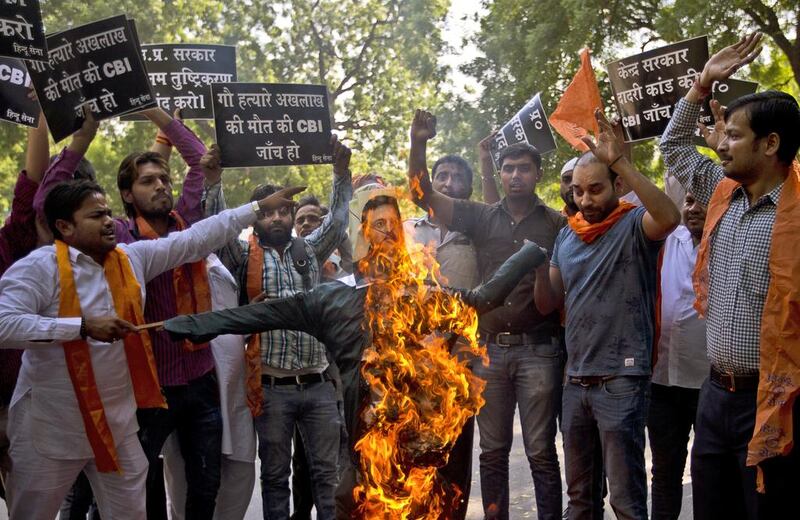NEW DELHI // More than two dozen Indian writers have returned their literary awards to the government, in protest at what they say is a climate of rising intolerance against minorities, liberals and rationalists.
They were joined on Tuesday by theatre actor Maya Krishna Rao, who returned her award to the Sangeet Natak Akademi, a government-funded body that promotes theatre, music and dance.
The protests were sparked by writer Nayantara Sahgal – the niece of India’s first prime minister Jawaharlal Nehru – who on October 6 said she would return an award given to her in 1986 by the Sahitya Akademi, a government-funded institution that promotes literature. In a statement announcing her decision, the 88-year-old, who writes in English, condemned a string of killings suspected of being carried out by Hindutva groups. These groups espouse Hindu nationalism and are allied to the ruling Bharatiya Janata Party (BJP).
“A distinguished Kannada writer and Sahitya Akademi Award winner, M M Kalburgi, and two Maharashtrians, Narendra Dabholkar and Govind Pansare, both antisuperstition activists, have all been killed by gun-toting motorcyclists,” Ms Sahgal said. “Other dissenters have been warned they are next in line.”
Mr Kalburgi, a fierce critic of several Hindu practices that he thought outdated or regressive, such as idol worship, was shot in his residence by an unknown gunman in August. It came after Mr Pansare was killed in February, and Mr Dabholkar killed in 2013. Both men were gunned down in streets near their homes, also by unknown gunmen.
The last straw, Ms Sahgal said, was the lynching by Hindutva activists of a Muslim farmworker named Mohammed Akhlaq – apparently on the suspicion that he had cooked and consumed beef in his house.
In the months since Mr Kalburgi’s killing, other writers had already returned some state awards in protest, she said. “In all these cases, justice drags its feet.”
“The prime minister remains silent about this reign of terror,” she added. “We must assume he dare not alienate evildoers who support his ideology. It is a matter of sorrow that the Sahitya Akademi remains silent.”
Many other writers have since followed Ms Sahgal’s example. One, the Hindi poet Ashok Vajpeyi, told prime minister Narendra Modi that even as writers and innocent people were being killed, “his ministers are making objectionable statements. Why doesn’t he shut them up?”
Others who have decided to return their state awards include the Malayalam writer Sarah Joseph; the Punjabi authors Gurbachan Bhullar and Ajmer Singh Aulakh; Aman Sethi, who writes in English; and the Urdu novelist Rahman Abbas.
K Satchidanandan, the Malayalam poet, resigned from the board of the Sahitya Akademi altogether on Saturday, saying that the institution was failing to protect freedom of expression in India.
“Annihilation should never be allowed to replace argument,” he wrote in his resignation letter. “That is the very essence of democracy.”
On Monday, at least 15 writers in the Konkani language – out of the 32 Konkani writers who have received various Sahitya Akademi awards – also announced that they would be returning their prizes.
The Sahitya Akademi has called for a meeting of its executive council next Friday (October 23) to deliberate the protests.
“At present, we do not know how to respond to those wanting to give back their awards,” Vishwanath Prasad Tiwari, the president of the Sahitya Akademi, said on Monday.
Earlier, Mr Tiwari had said that the writers should “adopt a different way to protest”.
“How can they blame the Sahitya Akademi, which has been in existence for over 60 years?”
It was not the work of the Sahitya Akademi to champion freedom of expression, he said. “If the Sahitya Akademi jumps in and protests against the restriction of the freedom of speech, then will it not divert from its primary work?”
Shekhar Sen, the chairperson of the Sangeet Natak Akademi, the body that promotes theatre, music and dance, told The National on Tuesday that these protests were "misguided".
“If something is wrong, of course someone should be punished,” Mr Sen said. “But the Sangeet Natak Akademi is an autonomous body, made up of artists who recognise artists.”
“It is funded by the government, but the supreme court is also funded by the government,” he said. “No one calls the supreme court a political body. In the same way, the Sangeet Natak Akademi is not a political body.”
If artists wanted to protest, Mr Sen said, they had several platforms available to them.
“They can create a theatrical play, or a dance drama, or a song, opposing what they feel is wrong,” he said. “They have every right to do it.”





